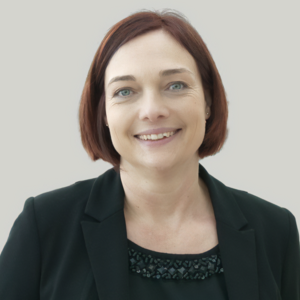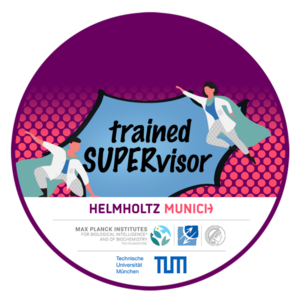
Doctoral Supervisor Training – Become the next SUPERvisor!
The Doctoral Supervisor Training offers support for the supervision of doctoral candidates on an academic and personal level. In cooperation with qualified trainers, various aspects of supervision, such as my role as a supervisor, leadership through communication, mental health, etc., are examined with best-practice examples in individual sessions. The training will provide you with a holistic overview of how you can best support your doctoral researchers from recruiting to career development.
Through the cooperation with scientists from different fields and institutions, the offer also provides a platform for professional exchange.
The jointly developed training is aimed specifically at professors, PIs, junior research group leaders, and postdocs at TUM, the two Max Planck Institutes for Biochemistry and Biological Intelligence, and Helmholtz Munich.
The structured program consists of eight modules taking place between February and April 2024. The kick-off, as well as the conclusion of the training, are designed as in-person events, while the other six content modules take place online via Zoom. The modules are linked by an exchange of experiences and practical applications.
Registration
If you are interested in participating in our doctoral supervisor training, please fill the registration form until December 8th, 2023. Please include a short motivation statement to explain why you would like to join the training.
You will be notified if you have been selected to participate one week after via email.
Program Outline
Module 1 | Kick-Off: Essentials of Supervision
Feb. 22nd 2024, 1 pm - 6 pm, in person at the Max Planck Institute of Biochemistry
Monika Beer, Neele Meyer Camila Hernández Frederick, Vera Kaulbarsch
Getting to know each other and clarification of expectations
Supervision timeline & formal aspects
Understanding my role as a supervisor
Team building & Get together
Module 2 | Self-Awareness, Emotional Intelligence & Non-violent Communication
Feb. 29th, 9 am - 1 pm, online
Ulrike Schneeberg
Introduction to the basics of Nonviolent Communication (NVC)
Understand and know how to manage own emotions in the workplace
Increase awareness of other people’s emotions and needs
Know how to integrate both their own and others’ needs and interests when communicating with others
Apply concepts of emotional intelligence to improve their communication skills, especially when giving feedback, resolving conflicts and or motivating a team
Use the tools of NVC to lead your team with empathy and make clear requests
Implement NVC principles in different case situations
Module 3 | Basics Leadership: Giving and Receiving Feedback, Clarification of Expectations
March 7th, 9 am - 1 pm, online
Martin Fladerer, Clarissa Zwarg
Giving and receiving feedback in a non-violent and constructive way
Regular constructive feedback as an integral part of the supervisory role
The importance of clarifying mutual expectations
Identifying potential changes in the way of giving feedback, using concepts shown to improve communication skills
Module 4 | Intercultural Communication
March 14th, 9 am - 1 pm, online
Ulrike Schneeberg
Learn about and get familiar with culture-specific dimensions of communication (Erin Meyer) to increase their awareness of cultural dynamics to foster successful and productive relationships with their supervised Doctoral Researchers
Reflect on and discuss their own, other participants’ and/or exemplary critical incidents in the context of cross-cultural work experience to evaluate the effectiveness of the employed behaviours in these specific situations.
Learn to identify and focus on underlying interests and not on positions.
Understand the concept of principled negotiation and its benefit in the supervision of DRs.
Module 5 | Mental Health
March 21st, 9 am - 1 pm, online
Judith Bergner
Being a role model for staying mentally strong in a challenging work-environment
Healthy self-motivation strategies
Self-calming strategies in stressful times
Knowing warning indicators for mental exhaustion
Establish routines to keep strain and regeneration in balance
Supporting doctoral researchers in dealing with different stressors
Create a safe work environment in which people can flourish
Module 6 | Recruitment & Onboarding
April 11th, 9 am - 1 pm, online
Martin Fladerer, Clarissa Zwarg
Introduction to the scientific basis of a structured recruitment process and the benefits of such a process
Understand cognitive biases and strategies to reduce these biases within the recruitment and selection process
Importance of effective onboarding and integration into the team
Know the process of organizational socialization (i.e., integration on three levels: professional, social, value-based)
Module 7 | Leading Difficult Conversations
April 18th, 9 am - 1 pm, online
Ulrike Schneeberg
In the weeks before this module, participants will conduct a role play via zoom with a professional actor, based on a specific scenario of their choice.
Analyzing, reflecting, and discussing the role play based on video feedback and feedback from the actors
Improve your conversational skills and deal with challenging conversations
Module 8 | Closing Event: Looking back & future vision as a supervisor
April 25th, 3 pm - 6 pm, in person, TUM Campus City Center
Monika Beer, Neele Meyer Camila Hernández Frederick, Vera Kaulbarsch
Reflection: My role as a supervisor after the training, definition of milestones & implementation strategy to put theory into practice
Impulse lecture with a supervisory role model and panel discussion
Networking Event & Award of Certificates
TrainersUlrike Schneeberg, PhD Judith Bergner Dr. Martin Fladerer Clarissa Zwarg OrganizersDr. Monika Beer Dr. Camila Hernández Frederick Dr. Vera Kaulbarsch Dr. Neele Meyer | ||







